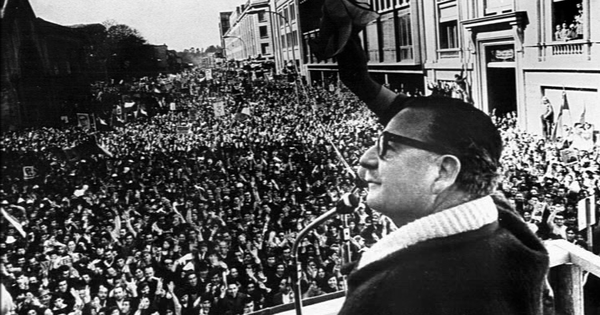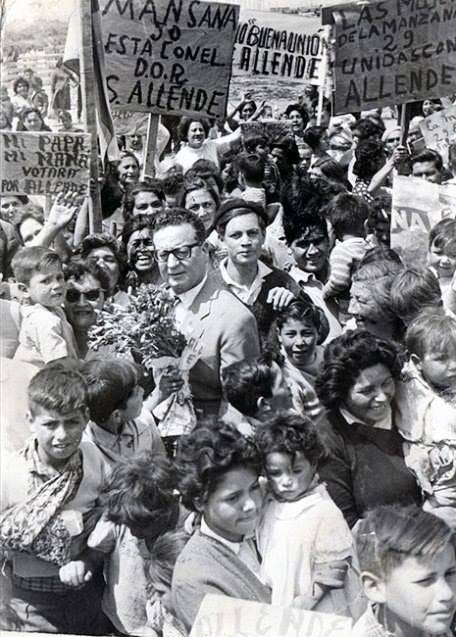Chile in the 1970s: A Decade of Turmoil and Transformation
Related Articles: Chile in the 1970s: A Decade of Turmoil and Transformation
Introduction
In this auspicious occasion, we are delighted to delve into the intriguing topic related to Chile in the 1970s: A Decade of Turmoil and Transformation. Let’s weave interesting information and offer fresh perspectives to the readers.
Table of Content
Chile in the 1970s: A Decade of Turmoil and Transformation

The 1970s in Chile were a period of profound social, political, and economic upheaval. The decade witnessed the rise and fall of Salvador Allende’s socialist government, a brutal military coup, and the subsequent establishment of a repressive dictatorship under Augusto Pinochet. This tumultuous period left an indelible mark on Chilean society, shaping its political landscape, social fabric, and economic trajectory for decades to come.
The Rise of Allende and the Unidad Popular
The 1960s in Chile were characterized by growing social and economic disparities. The traditional political parties, dominated by the conservative right and the center-left, failed to address the concerns of the working class and the rural poor. This dissatisfaction paved the way for the emergence of the Unidad Popular, a coalition of leftist parties led by Salvador Allende, a charismatic and popular figure who promised social justice and economic equality.
Allende, a committed socialist, campaigned on a platform of nationalizing key industries, redistributing land, and improving access to healthcare and education. His message resonated with a significant segment of the Chilean population, particularly the working class and the peasantry. In the 1970 presidential election, Allende narrowly defeated his conservative opponent, Jorge Alessandri. His victory marked a significant shift in Chilean politics, ushering in a period of socialist experimentation.
The Allende Government: A Period of Experimentation and Conflict
Allende’s government, known as the Unidad Popular, faced significant challenges from the outset. The Chilean economy was heavily reliant on copper exports, which were subject to volatile international markets. The government’s efforts to nationalize key industries, including copper mines, were met with fierce resistance from the United States, which feared the spread of communism in Latin America.
The Allende government also faced opposition from the Chilean right, which viewed the socialist experiment as a threat to their interests. They organized strikes, boycotts, and protests, seeking to destabilize the government. The political climate in Chile became increasingly polarized, with both sides resorting to violence and intimidation.
The 1973 Coup and the Pinochet Regime
The escalating political and economic crisis in Chile culminated in a military coup on September 11, 1973. Led by General Augusto Pinochet, the Chilean military seized power, overthrowing Allende’s government and installing a brutal dictatorship. Allende was killed during the coup, and the country plunged into a period of repression and human rights abuses.
The Pinochet regime, supported by the United States, implemented a series of drastic economic and social reforms. The government privatized state-owned enterprises, deregulated the economy, and suppressed all forms of dissent. The regime’s policies, known as the "Chicago Boys" model, were based on neoliberal principles and aimed to promote free market capitalism.
The Legacy of the 1970s: A Mixed Bag
The 1970s in Chile were a period of immense upheaval and change. The Allende government’s socialist experiment, while ultimately unsuccessful, highlighted the deep-seated social and economic inequalities in Chilean society. The Pinochet dictatorship, while achieving some economic success, came at a heavy cost in terms of human rights abuses and political repression.
The legacy of the 1970s continues to shape Chilean society today. The country has made significant progress in terms of economic development and political stability since the end of the dictatorship. However, the scars of the past remain, and the issues of inequality, social justice, and political accountability continue to be debated in Chilean society.
FAQs about Chile in the 1970s:
1. What were the main factors that led to the 1973 coup in Chile?
The coup was a culmination of several factors, including:
- Economic crisis: The Allende government’s socialist policies led to economic instability and inflation.
- Political polarization: The country was deeply divided between supporters and opponents of the Allende government.
- External pressure: The United States, fearing the spread of communism in Latin America, actively supported the Chilean military.
- Military ambitions: The Chilean military, under the leadership of Augusto Pinochet, had long harbored ambitions to seize power.
2. What were the main policies of the Pinochet regime?
The Pinochet regime implemented a series of neoliberal policies, including:
- Privatization: The government privatized state-owned enterprises, including banks, mines, and utilities.
- Deregulation: The government deregulated the economy, reducing government intervention in the market.
- Fiscal austerity: The government implemented tight fiscal policies, reducing public spending and raising taxes.
- Repression: The regime suppressed all forms of dissent, using torture, disappearances, and imprisonment to silence its opponents.
3. What was the impact of the 1970s on Chilean society?
The 1970s left a lasting impact on Chilean society, including:
- Economic transformation: The neoliberal policies implemented by the Pinochet regime led to significant economic growth but also increased inequality.
- Political repression: The dictatorship’s human rights abuses left a deep scar on Chilean society.
- Social fragmentation: The political polarization of the 1970s continues to affect Chilean society today.
4. What are some of the key lessons learned from Chile’s experience in the 1970s?
The 1970s in Chile offer several key lessons, including:
- The importance of social justice: The failure of the Allende government to address the deep-seated inequalities in Chilean society contributed to its downfall.
- The dangers of authoritarianism: The Pinochet dictatorship demonstrated the dangers of unchecked power and the suppression of dissent.
- The need for economic policies that promote equality: The Chilean experience highlights the need for economic policies that promote both growth and social justice.
Tips for understanding Chile in the 1970s:
- Read about the period: There are many books and articles that provide detailed accounts of the 1970s in Chile.
- Watch documentaries: Several documentaries explore the events of the 1970s, including the Allende government and the Pinochet dictatorship.
- Learn about Chilean history: A basic understanding of Chilean history is essential for comprehending the events of the 1970s.
- Engage in discussions: Talk to people who lived through the 1970s in Chile to gain firsthand perspectives.
Conclusion:
The 1970s in Chile were a period of immense turmoil and transformation. The Allende government’s socialist experiment, while ultimately unsuccessful, highlighted the deep-seated social and economic inequalities in Chilean society. The Pinochet dictatorship, while achieving some economic success, came at a heavy cost in terms of human rights abuses and political repression. The legacy of the 1970s continues to shape Chilean society today, reminding us of the importance of social justice, democratic values, and the need for economic policies that promote both growth and equality.








Closure
Thus, we hope this article has provided valuable insights into Chile in the 1970s: A Decade of Turmoil and Transformation. We thank you for taking the time to read this article. See you in our next article!